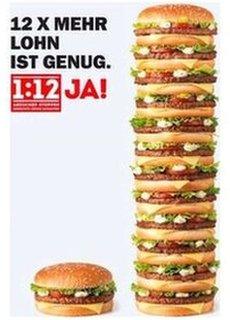Swiss electorate to vote on executive pay curbs
- Published
How many years would you have to work to earn $17.1m - one year's salary for Novartis' chief?
Swiss voters are going to the polls this weekend to decide on strict new laws to limit executive pay.
The measures, if approved, would limit the salaries of top managers to no more than 12 times the wage of the lowest-paid worker in the same company.
The 1:12 initiative is backed by Switzerland Young Socialists, who gathered the necessary 100,000 signatures to call a referendum.
It is the second time this year the Swiss have voted on top salaries: in March they voted overwhelmingly to curb big bonuses, and to ban golden handshakes and goodbyes.
Both votes reflect growing anger in Switzerland at revelations that some of the country's chief executives are earning more than 200 times what their employees take home.
It emerged earlier this year that Swiss banking giant UBS had awarded $2.6m (£1.6m) in bonuses - the figure matched exactly the bank's losses over 2012.
"In the last couple of years these managers were really earning a lot - too much," says Corinne Fankhauser, of the Young Socialists.
"For example, the chief executive of Credit Suisse, he was earning at one point 820 times what his [lowest-paid] employees were earning. So it's kind of crazy these wages. We want to stop this."
Appearing greedy
The Young Socialists have devised some clever campaign tactics: handing out free chocolate chip cookies on the streets, and telling passers by they can take as many as 12 if they want.
Of course, no-one does, because no-one wants to appear quite so greedy. The same attitude, the young socialists argue, should apply to executive pay.
But while the multi-million-dollar salaries paid out at the big banks are hitting the headlines, they are not the full picture.
The real backbone of Switzerland's economy are the hundreds of small and medium-sized enterprises across the country. The scheme would also affect them, and among their managers opinions are mixed.
Quality 'the priority'
Thomas Gerber is owner and chief executive of Amarena AG, a kitchen and furniture company. The business is small, but it has clients on four continents.
Mr Gerber has eight staff members and earns just 1.3 times what his employees do. He has no desire for more.
"I think it's very bad for Switzerland's image, for us as manufacturers, if we're only ever in the headlines because of these exorbitant salaries for managers," he explains.
"Switzerland is not just a lot of big companies, we are a society. I think we have to return to quality products… They are the important part of our business, not huge salaries."

The Young Socialists have been campaigning for restraints on top bosses' pay
'Stupid rulings'
But not everyone shares Mr Gerber's point of view. Many owners and managers fear the proposed restrictions risk punishing all of Switzerland's enterprises because of the high-profile mistakes of a few.
In line with company policy, Kurt Schaer, owner and director of BikeTec AG, which makes electrically powered bicycles, earns about five times what his staff earn, and he, too, says he does not want more.
"Of course I'm against too high salaries," he insists. "It's not good for the image. But basically we don't want to have influence from the government into the companies. It's a free decision of the shareholders how much they want to pay the management and the employees."
And, Mr Schaer warns, passing 1:12 would cost his company time and money proving to government auditors that BikeTec is obeying pay restrictions it already adheres to.
"We would have to hire more people in our accounting department," he says.
"I'd like to spend money to create new products, to create new markets… not spend money just to follow some stupid rulings."

Opinion polls suggest the vote will be a close one
Salaries 'driven downwards'
The Swiss government, too, is not keen on 1:12, pointing out that Switzerland has a relatively successful tradition of social partnership between business leaders and workers.
"Our way of agreeing salaries has led to lots of good jobs and very low unemployment," claims Economy Minister Johann Schneider-Ammann.
"I call it the Swiss recipe for success. I don't want to put this valuable system at risk.
"[If the vote is passed] the lowest wages would not really rise, it's far more likely all salaries would be driven downwards."
Some business leaders have also argued that limiting salaries in such an extreme way would mean Switzerland's leading enterprises would not be able to attract the top people if they could not pay top salaries.
But this argument has not been aired too widely, simply because over the last few months polls have shown that the very mention of high salaries irritates Swiss voters.
What has had more resonance has been the argument that foreign businesses might decide against setting up in Switzerland because of salary restrictions - something which opponents argue would lead to an increase in unemployment, and a decrease in tax revenue.
But ultimately neither the government nor business leaders will have the final say. Instead, in the long tradition of Swiss direct democracy, the voters will decide.
The opinion polls have been close, although the latest indicates that voters may believe 1:12 is a step too far.
But the fact that Switzerland is holding a nationwide referendum at all, just months after clamping down on bonuses, is a message to those high-earning bosses in the really big companies that excessive salaries - like 12 cookies - looks just plain greedy.
- Published3 March 2013
- Published1 March 2013